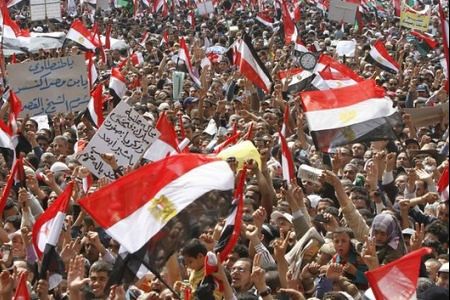
Thousands of Eyptians hold an anti-zionist and anti-US demonstration in Cairo on April 8, 2011. The demonstration demanded the re-opening of the border with Gaza and tried to take the Israeli flag from the embassy to replace it with a Palestine one., a photo by Pan-African News Wire File Photos on Flickr.
Morsi to 'reconsider' Egypt's deal with Israel
25 Jun 2012 11:08 - AFP
Egypt's president-elect wants to "reconsider" its peace deal with Israel and build ties with Iran to "create a strategic balance" in the Middle East.
The goals stated in an interview with Mohamed Morsi published by Iran’s Fars news agency on Monday are certain to alarm Israel and its ally the United States as they adapt to the new direction Egypt will chart with him at the helm.
They could also boost Iran’s influence in the Middle East at a time of heightened tensions between Tehran and the West.
“We will reconsider the Camp David Accord” that, in 1979, forged a peace between Egypt and Israel that has held for more than three decades, Morsi was quoted as telling a Fars reporter in Cairo on Sunday, just before his election triumph was announced.
He said the issue of Palestinian refugees returning to homes their families abandoned in the 1948 Arab-Israeli war and the 1967 Six-Day War “is very important”.
Morsi added though that “all these issues will be carried out through Cabinet and governmental bodies because I will not take any decision on my own”.
He also said he was ready to improve ties with Iran. The Islamic republic broke off diplomatic relations with Egypt in 1980, a year after Cairo signed the peace deal with the Jewish state.
“Part of my agenda is the development of ties between Iran and Egypt that will create a strategic balance in the region,” Morsi was quoted as saying.
Wary
Although Morsi resigned from Egypt’s Muslim Brotherhood to take the top job, Israel is wary of his election, fearing his Islamist record could jeopardise the chilly peace it has long enjoyed with its huge neighbour.
Iran’s foreign ministry on Sunday welcomed Morsi’s triumph.
Its message made no mention, however, of Iran and Egypt resuming diplomatic ties.
Iran’s clerical leadership contends that the Arab Spring that toppled veteran Egyptian strongman Hosni Mubarak and other longtime US allies in the Arab world last year was inspired by its own 1979 Islamic revolution.
Although Iran’s predominant faith is Shiite Islam and the Muslim Brotherhood adheres to the Sunni branch of Islam, Tehran has been reaching out to the organisation in Egypt in recent months.
Iran’s armed forces chief of staff, General Hassan Firouzabadi, on Monday was quoted by IRNA as echoing the Muslim Brotherhood’s rejection of moves by Egypt’s military to dissolve the Islamist-led parliament and to give itself a greater say over government policy and the Constitution.
“The actions of the military council in Egypt, which considers itself to be selected by Mubarak, lack legal validity and political legitimacy,” Firouzabadi said. – AFP
No comments:
Post a Comment